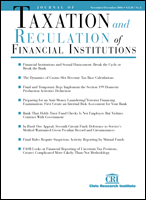Complete Issue
Author: Houman Shadab.
Source: Volume 30, Number 02, Winter 2017 , pp.1-64(64)

< previous article |return to table of contents
Abstract:
This issue of the Journal of Taxation and Regulation of Financial Institutions begins with an examination of an important new framework use by the Office of the Comptroller of the Currency (OCC) to assess civil money penalties. Authors Frank A. Mayer III, John E. Bowman, Richard M. Berman, Jonathan L. Levin and Adrienne C. Beatty discuss the OCC’s revisions to its civil money penalty framework that both lower the thresholds for triggering sanctions against financial institutions and institution-affiliated parties for operational and compliance failures and raise the penalties. In our second article, Alan Appel explores rules from the Treasury Department’s Financial Crimes Enforcement Network that are intended to curb foreign investors’ efforts to hide the proceeds of their illegal activities in U.S. assets through the use of shell companies with hidden owners. Mr. Appel covers general requirements relating to anti-tax-avoidance measures, opening new accounts, and high-end real estate purchases made with cash. Christopher G. Brown discusses recent developments in foreclosure law in our third article. Focusing on Connecticut, Mr. Brown discusses cases that seem to indicate a pro-borrower trend in the areas of dual tracking, predatory lending, and lien stripping for loss mitigation. Our fourth article turns to the nationwide trend of encouraging investment through tax credits. David D. Ebersole discusses angel investments in general and focuses on Georgia’s angel tax credit in particular as an example of trend. As in other states, to qualify for the Georgia credit the investor must be sufficiently sophisticated, the business must be small and maintain its business in the state, and the investment structure must be common or preferred stock or qualified subordinated debt. Compliance with the Foreign Account Tax Compliance Act (FATCA) as it applies to investment funds the subject of the next article, by John P. Dombrowski. Mr. Dombrowski first gives an overview of the FATCA regime and then explains how it applies to the documentation of an investment fund structured with offshore accounts. In our sixth article, Megan E. Campos discusses the tax exempt status of U.S. investments made by foreign high-net-worth individuals through a non-U.S. corporation owned by a trust. The issues raised by such investments are relevant to financial institutions with private client divisions that work with international or cross-border families and must be cognizant of the FATCA reporting requirements involved. This issue concludes with a state and local column by John P. Barrie. Mr. Barrie discusses the October 13, 2016, Section 385 final and temporary regulations—and finds the overall news to be good for financial institutions.Keywords: OCC Standards; Reporting Obligations; Foreclosure Litigation; Angel Investment Tax Credit; FATCA Compliance; Foreign Grantor Trusts; Section 385 Regulations
Affiliations:
1: New York Law School.